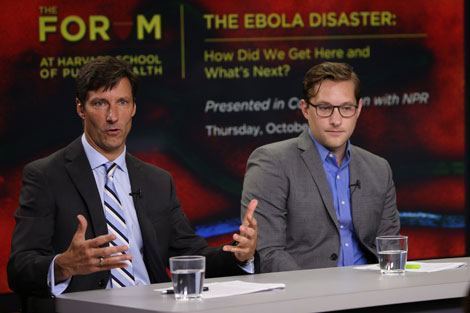November 20, 2014 — The humanitarian response to the Ebola outbreak in West Africa has been fraught with challenges, according to Michael VanRooyen, director of the Harvard Humanitarian Initiative and professor in the Department of Global Health and Population at Harvard School of Public Health (HSPH).
“It’s been like building the firehouse while the building is burning,” VanRooyen told an HSPH audience at his November 12, 2014 talk, “The Humanitarian Dimensions of the Ebola Epidemic.” The talk was sponsored by the Office of the Dean as part of a lecture series on the current Ebola outbreak.
Initial response to the outbreak by world leaders and aid organizations was slow, VanRooyen said. Despite the fact that aid organizations working in West Africa last spring raised concerns about the spread of Ebola, it took several months for other aid groups and governments to respond. Today more than 60 nongovernmental organizations, the U.S. military, and other governments are helping address the disease outbreak that has claimed about 5,500 lives and sickened approximately 14,000.
Many responders were unfamiliar with the disease, which has a high transmission rate, is difficult to treat, and has killed some health professionals who have treated Ebola patients. The problem was compounded because the outbreak occurred in a conflict-ravaged part of the world with a weakened health system. “Ebola is nasty, fatal, and personal,” VanRooyen said.
Learn more
The Ebola Disaster: How Did We Get Here and What’s Next? (The Forum at Harvard School of Public Health, October 2, 2014)
Ebola in the news (HSPH News)
Centers for Disease Control and Prevention Ebola Information
World Health Organization’s Ebola fact sheet
–Marge Dwyer
